Related Research Articles
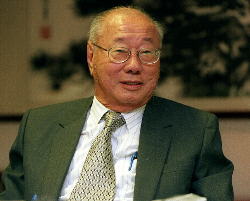
Lim Kim San was a Singaporean politician who served as a Cabinet minister between 1965 and 1981. During World War II, Lim was tortured on suspicion of being pro-communist and pro-British. Lim was part of a public housing programme in the country during the early 1960s, which was aimed to address the housing shortage problem at the time.
The history and subculture surrounding transgender people in Singapore is substantial. As with LGBT rights in the country in general, transgender rights in Singapore have also evolved significantly over time, including various laws and public attitudes in regards to identity documents, as well as anti-discrimination measures used by or pertaining to transgender people, in the areas of employment, education, housing and social services, amongst others.

Clifford Pier was a former pier located beside Collyer Quay at Marina Bay within the Downtown Core of the Central Area, Singapore. The pier, which opened in 1933, ceased operations in 2006.
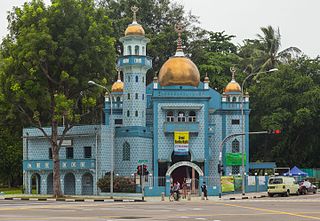
Masjid Malabar or Malabar Muslim Jama-Ath Mosque, also known as Golden Dome Mosque; is Singapore's only Malabar Muslim mosque. The mosque is located at the junction of Victoria Street and Jalan Sultan in the Kampong Glam district, in the Rochor Planning Area within the Central Area. The mosque is built on the Sultan Mosque style with traditional blue and white lapis lazuli tile facade. The mosque was nicknamed as little cousin of the Sultan Mosque, because of similar golden domes.
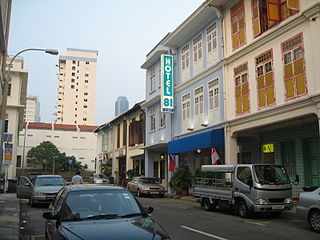
Jiak Chuan Road is a two-way road in Chinatown within the Outram Planning Area in Singapore. The road links Teck Lim Road to Keong Saik Road, it is home to several budget hotels and rows of shophouses. The place was formerly part of the Keong Saik Road red light district, home to numerous brothels.
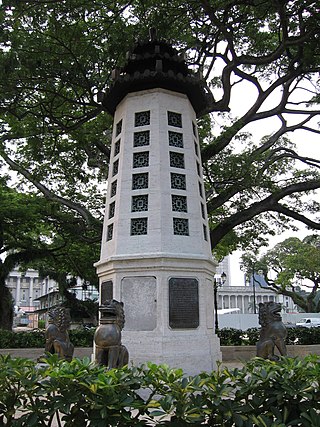
The Lim Bo Seng Memorial is an octagonal pagoda-like war memorial at Esplanade Park, Singapore. It was erected in 1954 in honour of the late Lim Bo Seng for his heroic acts and selfless sacrifice during the World War II. The war memorial is the only structure in Singapore that commemorates an individual's efforts in World War II and was gazetted as a national monument on 28 December 2010.
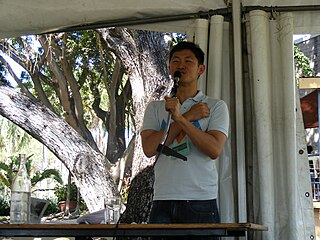
Ng Yi Sheng is a Singaporean gay writer. He has published a collection of his poems entitled last boy, which won the Singapore Literature Prize, and a documentary book on gay, lesbian and bisexual Singaporeans called SQ21: Singapore Queers in the 21st Century in 2006.


The Singapore Conference Hall is a multipurpose building located in Shenton Way of Singapore. It was gazetted as a national monument on 28 December 2010.

William Siew Wai Lim was a Singaporean architect. Some of his noted designs included People's Park Complex (1973), the Golden Mile Complex (1974); and the Tanglin Shopping Center, all in Singapore. Lim wrote and lectured on a wide range of subjects relating to architecture, urbanism, and culture in Asia as well as on current issues relating to the postmodern, glocality and social justice. He was the author of Asian Alterity: With Special Reference to Architecture and Urbanism through The Lens of Cultural Studies (2008), as well as editor of Asian Design Culture (2009) and co-editor of Non West Modernist Past (2011).
Syed Mohamed bin Syed Ahmad Alsagoff was an Hadhrami Muslim born in Singapore who was known as Nong Chik.
Lim Kean Chye was a Malaysian politician and lawyer.

Epigram Books is an independent publishing company in Singapore. It publishes works of Singapore-based writers, poets and playwrights.
David Joseph Murnane (1892–1953) was Singapore's longest serving municipal water engineer, serving from 1925 to 1947.
Heng Siok Tian is a Singaporean poet and educator. She has published five volumes of poetry: Crossing the Chopsticks and Other Poems (1993), My City, My Canvas (1999), Contouring (2004), Is My Body a Myth (2011) and Mixing Tongues (2011).
Mohamed Latiff Mohamed was a Singaporean Malay poet and writer.

Alkaff Gardens was a Japanese-style park once located east of the Bidadari Cemetery from 1930 to 1964, on the present site of Cedar Girls' Secondary School at Bidadari, Singapore. In the 1930s, the park was a popular leisure destination for dating couples and families. It featured as its centrepiece an artificial lake, which was drained in 1964.
Zulkifli bin Mohammed is a former Singaporean politician. A member of the ruling People's Action Party, Zulkifli was involved in politics for 14 years before retiring from politics in 1996.

Quah Chin Lai was a Singapore metal and machinery hardware tycoon and philanthropist.
References
- ↑ Yamada, Teri Shaffer (1 January 2009). Modern short fiction of Southeast Asia: a literary history. Association for Asian Studies, Inc. pp. 228–. ISBN 978-0-924304-52-1 . Retrieved 10 May 2011.
- ↑ "Nicky Moey | Infopedia". eresources.nlb.gov.sg. Retrieved 30 November 2022.
- 1 2 "Nicky Moey". www.goodreads.com. Retrieved 30 November 2022.
- ↑ "Nicky Moey (Author of Song of Suspense)" . Retrieved 4 September 2011.
- ↑ "Obsession with horror and fantasy". eresources.nlb.gov.sg. 31 August 1988. Retrieved 30 November 2022.
- ↑ "999 True Cases From the CID". Goodreads. Retrieved 30 November 2022.
- ↑ "Singapore: Ghost Story II". eresources.nlb.gov.sg. 4 November 1990. Retrieved 30 November 2022.
- ↑ "literature can help boost productivity". eresources.nlb.gov.sg. 31 August 2001. Retrieved 30 November 2022.
- ↑ "Asian Ghost Stories and more | Dewdrop Notes 露语". 30 March 2018. Retrieved 30 November 2022.
- ↑ குழுவினர், அரூ (19 January 2019). "A chat with Cyril Wong on speculative fiction". அரூ. Retrieved 30 November 2022.
- ↑ Peru, Farouk A. (17 March 2017). "My Tunku Halim experience". Malay Mail. Retrieved 30 November 2022.
- ↑ "Suspense-horror with a touch of satire". eresources.nlb.gov.sg. 6 September 1986. Retrieved 30 November 2022.
- ↑ "Nicholas Moey Cover Photo". Facebook. Retrieved 30 November 2022.